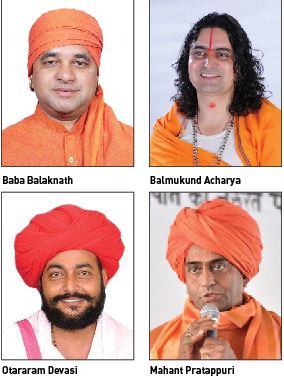
The Rajasthan Legislative Assembly elections witnessed the voting process on November 25, covering 199 out of the state’s 200 assembly seats. The eagerly anticipated election results are scheduled to be announced on December 3. As the electoral process unfolds, speculation about victory and defeat has already ignited discussions in the state. Candidates and political parties are actively involved in rallying their supporters and analysing voting statistics across constituencies. In Jaipur district, attention is particularly focused on the 19 assembly seats, where the BJP has strategically employed the Hindutva card in Rajasthan.
A ticket from the Tijara Assembly constituency was given to Baba Balaknath
In the Tijara constituency of Alwar district, the BJP has put forward MP Balaknath Yogi as its candidate, while the Congress has nominated Imran Khan. This area holds a substantial number of Yadav, Gurjar, Muslim, and SC-ST votes, promising an intriguing competition. The voter turnout in Tijara reached 86.11% this time, compared to 81.98% in 2018, 85.86% in 2013, and 71.8% in 2008. In the 2018 elections, BSP’s Sandeep Yadav emerged victorious, with the BJP securing the third position. In 2013, BJP’s Manan Singh Yadav had a significant win, with Congress in the third position and BSP in the second. Imran Khan is the Congress nominee for this seat in the current elections.
BJP fielded Balmukund Acharya from the Hawa Mahal assembly constituency
In the Hawa Mahal assembly constituency in Jaipur, the BJP has nominated Mahant Balmukund Acharya, renowned for his contributions to the Hathoj Dham. Recently gaining prominence, Balmukund Acharya secured the BJP’s nomination for this assembly constituency. Meanwhile, the Congress city president, A.R. Tiwari, is also contesting. The voter turnout in this constituency reached 76.30%, marking a four per cent increase from the previous elections. In 2018, the turnout was 72.78%, in 2013, it was 73.64%, and in 2008, it was 57.8%. Hawa Mahal is characterised by a substantial Muslim voter base, and traditionally, Brahmin candidates have been successful. Due to this historical trend, analysts refrain from making definitive predictions for this constituency.
BJP gave Otararam Devasi the ticket from the Sirohi Assembly constituency
In the Sirohi Assembly constituency, the voter turnout was recorded at 65%. Otararam Devasi has been named as the BJP candidate for the Sirohi assembly seat. Devasi previously served as a BJP MLA from 2013 to 2018 and held a ministerial position during the Raje regime. Starting as a constable in the police force, Devasi later embraced the path of spirituality and became a devoted follower of Goddess Chamunda. He currently serves as the chief of the Mundara Mata Temple.
Mahant Pratappuri was fielded from the Pokaran assembly constituency
In the Pokaran assembly constituency, renowned for its nuclear testing history, the voter turnout stood at 87.79%. This figure matches the voter turnout in the last two terms. The BJP has nominated Mahant Pratappuri, the current head of the Taratara Math, for this constituency. Notably, Mahant Pratap Puri’s supporters draw parallels between him and Uttar Pradesh Chief Minister Yogi Adityanath. Contesting against him is Sale Mohammad, the Congress candidate and the son of a Muslim religious leader, Gazi Fakir. Gazi Fakir commands a significant following, not only in India but also in neighbouring Pakistan, adding an intriguing dynamic to the electoral competition in Pokaran.
The strategic use of the Hindutva card by the BJP in four key constituencies in Rajasthan has added a layer of complexity to the electoral landscape. The nominations of prominent figures, such as Mahant Balmukund Acharya and Mahant Pratappuri, showcase a deliberate move to appeal to specific voter bases. The voter turnout statistics in these constituencies, coupled with the historical voting patterns, suggest a keenly contested election. As the anticipation builds for the announcement of results on December 3, the political dynamics in these constituencies remain unpredictable, with both the BJP and Congress vying for an edge in this closely watched electoral battle.